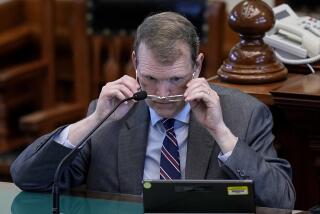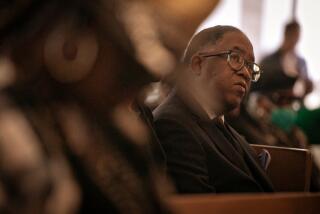Jurors Didn’t Find Robbins Credible
- Share via
SACRAMENTO — In his starring role as witness for the prosecution in the trial of lobbyist Clayton R. Jackson and former state Sen. Paul B. Carpenter, Alan Robbins took his share of abuse.
Defense attorneys called the former Democratic state senator from Van Nuys nearly every name in the book, a colleague labeled him a joke and Robbins himself said that, while in prison waiting to testify, he suffered “almost every imaginable kind” of harassment from inmates who pegged him as a snitch.
But in perhaps a final indignity, jurors who Wednesday agreed with Robbins that Jackson and Carpenter were corrupt said the former high-powered champion for the San Fernando Valley had failed to impress them as a credible witness.
“I didn’t believe anything he said,” juror Ken Richins, 47, a computer engineer from Gridley, said after the verdicts. “The government would have gotten a conviction without Alan Robbins.”
Juror Mike Tuman, a millwright from Gridley, said it was the evidence, not the government’s star witness, that led the panel to decide Jackson’s and Carpenter’s guilt in an hour and a half. “I didn’t think Alan Robbins was that credible at all,” Tuman said.
Juror Robert Bartosh, an employee of the Campbell’s Soup Co. in Sacramento, said many panelists believed Robbins’ lies and the defendants’ lies canceled each other.
“I didn’t believe anything Robbins would say. He’d say anything that he thought would help him,” Bartosh said. “My personal opinion is he wasn’t highly credible and that he and the other two (Jackson and Carpenter) would have lied to save themselves.”
But despite their reaction to Robbins in the courtroom, jurors said audiotapes that Robbins secretly recorded of his conversations with Jackson--upon which much of the prosecution’s case hinged--were critical to the guilty verdicts.
On the witness stand it was a different story. It did not seem to matter that Robbins--who had a lot riding on his performance, most notably a reduced prison sentence--was on his best behavior for the courtroom, politely answering questions and exuding humility.
Even before Robbins took the stand, jurors were prepped on how he, Jackson and Carpenter had turned influence-peddling and money laundering into a lucrative fine art.
“Alan Robbins has done some pretty terrible things over his lifetime and you’ll hear about them,” U.S. Atty. John Vincent conceded about his first witness in opening arguments. Indeed, defense attorneys went on to describe Robbins as “the devil,” “a known liar, perjurer and extortionist” and seemingly everything in between.
In June, 1992, Robbins began serving a federal prison term after pleading guilty to racketeering and income tax evasion and admitting in court that he used his office to extort cash and campaign contributions from a range of people.
But the self-made millionaire, onetime Los Angeles mayoral candidate and former 18-year state senator cut his five-year sentence by more than half in agreeing to help federal prosecutors nail more violators in the continuing political corruption probe.
Even with the guilty verdicts this week, Robbins--who was described in the harsh words of juror Richins as “a scumbag”--is not out of the woods.
He still faces formidable legal obstacles: ongoing civil suits, the attempted revocation of his real estate license, a 15-count accusation of wrongdoing from the California Fair Political Practices Commission and sentencing in a Los Angeles banking fraud case.
Assistant U.S. Atty. Jeffrey Isaacs said sentencing for the Los Angeles case had been postponed until the Sacramento trial concluded. He said U.S. District Judge Robert M. Takasugi will likely mete out punishment within the next two months.
According to Robbins’ deal with the government, his prison time for the bank fraud case--in which he pleaded guilty to providing false information to obtain bank loans--will run concurrent with his political corruption sentence. He will get credit for some time served, and could be released as early as March.
*
Times staff writers Mark Gladstone and Carl Ingram contributed to this report.
More to Read
Get the L.A. Times Politics newsletter
Deeply reported insights into legislation, politics and policy from Sacramento, Washington and beyond. In your inbox twice per week.
You may occasionally receive promotional content from the Los Angeles Times.










